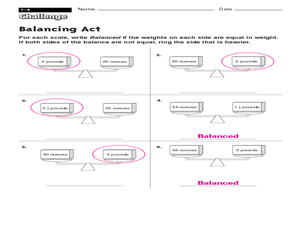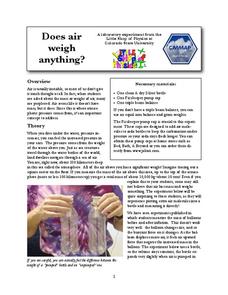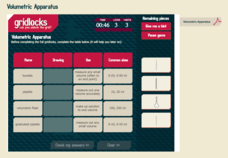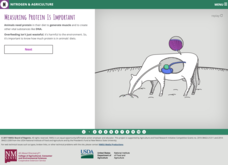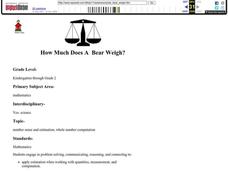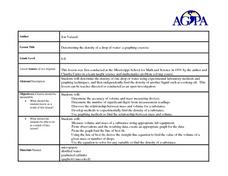Curated OER
Using a Balance to Compare Weights
In this using a balance to compare weights worksheet, 3rd graders compare two weights in pounds and ounces, write "balanced" if they are equal or circle the one that is heavier if they are not equal.
Colorado State University
Does Air Weigh Anything?
Can you feel the weight of the air on your shoulders? Your classes may not believe that air has weight. A straightforward experiment asks individuals to weigh a bottle before and after adding air. Their results may surprise them!
Cornell University
Density
Certain things just do not mix, including liquids of varying densities. Learners collect data to determine the densities of several liquids. They then use the density information to predict the type of liquid.
CPO Science
Science Worksheets
If you need an array of worksheets to augment your science lessons, peruse a collection of assignments that is sure to fit your needs. With topics such as metric conversion, the scientific method, textbook features, research skills,...
Teach Engineering
Density Column Lab - Part 2
Groups suspend objects within layers of liquids to determine the densities of different liquids and compare them to the densities of objects calculated in Part 1. The groups then carefully test their calculations by layering the liquids...
Virginia Department of Education
Isotopes
Lead your class through the amazing world of isotopes as they investigate the various properties they contain and further understand their respective location on the periodic table. They explore half-lives and radioactivity as each...
Curated OER
Unit V: Worksheet 2 - Constant Force
Physics learners studying force and acceleration practice solving eight problems with this assignment. They calculate acceleration and deceleration, net force, and distances required for stopping a moving object. Kinematics equations and...
Virginia Department of Education
States and Forms of Energy
Energy is just energy, right? Explain various forms of energy to your young scientists by using an interactive experiment that contains common objects to demonstrate complex concepts. Pupils conduct experiments for radiant, thermal,...
National Institute of Open Schooling
Chemical Arithmetics
Substances with the same empirical and molecular formula must be differentiated by their structural formula. Part two in a series of 36 has pupils using chemical formulas to calculate how much of a compound is present in a given...
Noyce Foundation
Time to Get Clean
It's assessment time! Determine your young mathematicians' understanding of elapsed time with this brief, five-question quiz.
Virginia Department of Education
Moles Lab Activities
Want my name and number? It's 6.0221415 times 10 to the 23rd, and my name is Avogadro. Providing nine different activities, experiments, and labs, this lesson keeps Avogadro relevant to your class all year long.
Nuffield Foundation
Investigating the Effect of Concentration of Blackcurrant Squash on Osmosis in Chipped Potatoes
Model and explore osmosis using squash and potatoes. Young scientists expose chunks of potatoes to different concentrations of a squash solution. They compare the weights of the chunks before and after exposure to the solution and use...
Lane Community College
Review Sheets: Introductory Physical Science
This hybrid worksheet connects mathematics to a science class. Learners practice solving problems that involve making a variety of conversions. An assortment of questions hits all the calculations needed for a middle school or beginning...
Columbus City Schools
It’s All Relative
Are the people on the other side of the world standing upside down? Pupils discuss the relationship between movement and position words. The unit explores the concept of reference points through animation, modeling, photography, and more.
Royal Society of Chemistry
Volumetric Apparatus
Can your class tell the difference between a burette and a pipette? Develop their lab apparatus knowledge using a series of puzzles. The online activity associates the name, image, and sizes of burettes, pipettes, volumetric flasks, and...
Curated OER
The Physics of Flight
Three activities allow young flight engineers to understand the 4 principles of flight (weight, lift, thrust, and drag), to construct a glider, and to create a propeller. Multicultural history and literature are integrated by reading...
Learning Games Lab
Nitrogen in Feed
Knowing what farmers are feeding livestock is just smart business. A WebQuest lesson helps learners build an understanding of the relationship between amino acids, nitrogen, and protein. With interactive instruction, scholars practice...
Normal Community High School
Golf Ball Lab
The first golf balls were made of wood and would only last for a few games. Modern golf balls last a lot longer but they don't float. The presentation provides the directions for a lab to determine the minimum amount of salt needed to...
Curated OER
Weight, The Metric System
In this metric weight worksheet, students solve 10 multiple choice questions regarding metric units of weigh or mass. Students must be able to convert metric units of mass or weight. The worksheet is interactive and answers can be foud...
Curated OER
How Much Does a Bear Weigh?
Students estimate how many children in their class it would take to equal the mass of one adult bear. They then weigh and record their measurement on a chart to check their estimate.
Curated OER
Determining the Density of a Drop of Water-A Graphing Exercise
Students determine the density of 1 drop of water. In this determining density lesson plan, students determine the mass and volume of a drop of water in the lab using appropriate lab techniques and calculate the density of a drop of water.
Curated OER
The Many Faces of Energy
In this energy worksheet, students are given a table of the many measurements of energy. They solve 6 problems converting from one measurement of energy to another using the conversion factors given.
Curated OER
Acceleration 2
In this acceleration worksheet, students experiment with varying amounts of mass to observe the effects on the force needed to move an object. Students apply Newton's Second Law of Motion to describe the relationship between mass and...
Curated OER
The Relationship Between Salinity and the Density of Water
Students investigate density and salinity of water. In this density and salinity lesson plan, students find the density of objects and liquids and show the relationship between the salinity and density of water. Students add salt to...
Other popular searches
- Measuring Mass of Balloons
- Measuring Mass and Weight
- Measuring Mass and Volume
- Measuring Mass Activity
- Tools for Measuring Mass
- Measuring Mass Triple Beam
- Measuring Mass Stations
- Measuring Mass With Scale
- Measuring Mass Biology
- Measuring Mass Centers
- Measuring Mass Worksheet
- Measuring Mass Math


